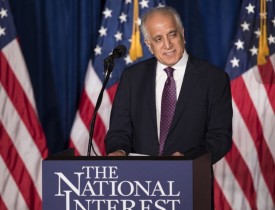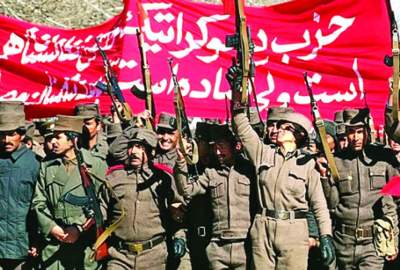Afghanistan-born Zalmay Khalilzad had a central role in shaping the approach of U.S. President George W. Bush’s administration toward Afghanistan after 9/11. In an interview with RFE/RL Gandhara website, Khalilzad says President Donald Trump’s current strategy in Afghanistan requires a presidential envoy to succeed. Drawing on decades of government expertise, he says the strategy must involve changing Pakistan’s outlook toward Afghanistan, preventing a domestic political implosion, and offering long-term economic prosperity and security for Afghans.
RFE/RL: Do you see any positive impact of Trump’s new strategy so far?
Zalmay Khalilzad: Psychologically, it has had a good impact on the Afghans. Based on Trump’s campaign and some of his statements before he became president, they feared abandonment by the United States. The revalidation of the American objective in Afghanistan, and the adjustment in the strategy indicating a recommitting are positive impacts.
The addition of forces, the delegation of more authority to the commander as to how he uses the force, the commitment to get more involved in the fight not only against Daesh (eds: Arabic acronym for Islamic State militants) and Al-Qaeda but also against the Taliban has had a positive impact.
The focus on sanctuaries, particularly in Pakistan, has had a good impact in terms of the Afghans. But … Pakistani policy has not changed. And the question the administration faces is what to do because changing the Pakistani approach to Afghanistan is fundamental to the success of the strategy; it’s a central assumption.
RFE/RL: If you were in a position to do so, what would you do to change Pakistan’s policies?
Khalilzad: I’m pessimistic that Pakistan’s policies can change easily. While it is necessary, it will require a demanding approach, and by that I mean it probably has to become coercive.
One [way] is to go after the sanctuaries by use of drones and other means. Second is to put individuals involved in support of the Haqqani network and the Taliban and others on a list where they can’t do business as usual or travel to the West. Third is to increase economic pressure on Pakistan in terms of bilateral assistance, making more assistance conditional, and have other allies -- Europeans, Japanese -- make their assistance conditional. And even international help -- IMF, World Bank, where the U.S. and the West have considerable influence -- to be conditional.
A newly border fence along with Afghanistan's Paktika province border and Angoor Adda in Pakistan's South Waziristan tribal district.
A newly border fence along with Afghanistan's Paktika province border and Angoor Adda in Pakistan's South Waziristan tribal district.
Then there is the Indian issue, which should be used smartly. If Pakistan doesn’t change, there will be a greater role for archrival India, a greater burden-sharing in Afghanistan. The U.S. needs a plan as to when from this diplomatic engagement it shifts to a coercive approach where for six months we try this and if it doesn’t work then we shift to the other.
Afghanistan’s success requires a change in Pakistani policy, a better relationship, and respecting legitimate Pakistani interests. You can’t stabilize Afghanistan in the immediate to midterm without Pakistani cooperation.
RFE/RL: Do you see the Trump administration, which is now dealing with a broad array of challenges and has yet to make key appointments, changing Pakistan’s approach in the short term?
Khalilzad: The administration has repeated multiple times that one way or another -- perhaps even implying force would have to be used -- that Pakistan will have to change. Either they change or we, the U.S., would have to do whatever is necessary to deal with the problem. That is a big challenge. And they implicitly, and even explicitly, stated that this administration is determined to deal with this problem, but how and when is not clear.
The other issue is that the president has emphasized an integrated approach that takes into account Pakistan, the Taliban, the military effort, but also political efforts in Afghanistan, regional efforts, economic development, and [yet] there is a question of how this will happen. People have talked about the appointment of a presidential envoy that would integrate all that, but that has not happened yet. That will be one way integration of the policy could occur.
RFE/RL: The Afghan government is united in name only, and hardly anything hopeful is happening on the political front. Do you think domestic Afghan politics are being ignored and that feeds into the Taliban’s strategy of waiting it out?
Khalilzad: There is a dilemma that Afghans and their friends need to address effectively: the elite politics -- various political forces and the maneuvering over power -- and the need for reform, improvement in governance, improvement in economic conditions and services to the population.
This is a tricky challenge, and it requires the elite -- both who want reform and those who benefit from issues like corruption -- to rise to the occasion and take the national interests into account. The world is watching the commitments Afghanistan has made to the United States, the international community that it has to deliver almost like conditions for continued engagement. This is very tricky, and it’s very important, and it’s very difficult.
RFE/RL: Do you see Washington dealing with this challenge?
Khalilzad: The ambassador has just gone there, so we have to wait and see. It’s highly important Washington recognizes the importance of this, because sometimes you get the impression that the only thing that is important is the military part, but the politics are also extremely important. If politics are not going the right way, it can create security problems which the military has to then deal with, and sometimes you cannot deal with it successfully without dealing with it politically.
RFE/RL: Do you see a scenario like in 2001 where the U.S. military has nearly absolute victory on the ground but then later on, because of not addressing the political and the regional problems, Afghanistan doesn’t pan out the way it was supposed to?
Khalilzad: One should never underestimate military success, and not only tactical military success but also strategic military success. The successes of the early period that you refer to did not address the issue of sanctuaries. The sanctuaries and the Taliban regrouping, and some of the political challenges within Afghanistan created the conditions for the Taliban to become a bigger challenge. It’s one thing to win military engagement, and it’s another thing to win peace.
Peace and enduring success requires a professional security force; it requires political understanding including reconciliation with the Taliban or elements that want to reconcile. It requires improvement in governing, balanced development, [and] economic development because sometimes youngsters are recruited purely because the extremists pay them more than they could get otherwise.
So it needs a comprehensive approach. If you think every problem can be dealt with militarily, that’s a mistake. We need to have various instruments at work. If the only thing you have is a hammer, then everything looks like a nail.
RFE/RL: One of the key things in Afghanistan has been reconciliation among Afghans. Does this current strategy focus enough on bringing the Taliban to the table and integrating them into the political system, or some kind of compromise that could ensure lasting peace?
Khalilzad: It does. The ultimate objective of the strategy is to bring the Taliban to the table; that’s a step of success. The question that right now has been focused on and appropriately is to work on the conditions.
During the Obama administration, the message that the U.S. was getting out was that the U.S. wasn’t going to fight the Taliban and that it was an Afghan problem. It didn’t encourage reconciliation; it sustained the opposition -- it sustained the Taliban. The Taliban thought wow, time is on their side. The Americans are going to leave; they are going to win. Why should they compromise?
The Taliban did make successes. The areas they were contesting and the areas they controlled expanded dramatically. So now if you can work on the conditions that first the strategy that America is recommitted is important, a signal to set the strategic context, and then to show success militarily on the ground, and then work on diplomacy including in Pakistan, which is a key player and with the goal of ultimately an agreement. We’re not quite there yet, so there’s time for these other elements to be brought in.
Setting the conditions also means the Afghans managing their politics, because if militarily you do a little better and the Taliban are challenged and pushed back in this or that area, politics can go in the opposite direction.
RFE/RL: In 2001, when you were part of the administration that won the war, there was near consensus globally on backing the U.S. military effort. But now you have a lot of destabilizing rivalries in Afghanistan, and none of Afghanistan’s neighbors -- apart from India, perhaps -- is in favor of a long-term American military presence. How do you resolve that?
Khalilzad: It’s one thing to talk about the long-term U.S. presence, and the Afghans have said that for any peace negotiations, that’s a subject on the table. It’s leverage the Afghan government has.
But a U.S. withdrawal without a settlement plays into the hands of the Taliban because that would weaken the government and change the balance in [their] favor. And the region doesn’t want that. While some players have questions about U.S. intentions and the effects of a long-term U.S. presence, there is broad agreement that [their premature withdrawal will be problematic]. [Former Afghan President Hamid] Karzai -- who was a very serious critic of the U.S. strategy -- has repeatedly said, when he went to China, he went to Russia, he went to Pakistan, except for Iran everyone else told him, you better sign this security agreement to keep the U.S. there, as the absence of the U.S. would be worse. But they also said they don’t want the U.S. to be there for the long term. The long term is really related to a settlement, so I think ideally you would like to have a regional consensus that’s supportive of the U.S., although Russian President [Vladimir] Putin recently made a positive statement about cooperating with the U.S. in Afghanistan. So we’ll see.
The worsening of the situation because of the Obama policies where the Taliban were getting stronger, the rise of Daesh, had an effect on regional attitudes, especially Russia and Iran. Russia thought maybe the Taliban can be an instrument to fight Daesh because they were more concerned about Daesh especially in northern Afghanistan, Iran similarly. But now the balance shifts; there could be an adjustment. One reason for a special envoy would be to deal with that regional diplomacy.
RFE/RL: If you had Trump’s ear and he asked for advice to ensure his strategy will ultimately be a success, what would you tell him?
Khalilzad: I would tell him first that integration, as he’s said, is very important; he should appoint someone as a presidential envoy, someone he knows and he trusts and has his confidence.
Second, that we need to pay attention to the Pakistani dimension; I give him credit for highlighting this. Now he needs a game plan of what will happen when. If there is no cooperation, then I think, of course, a coercive strategy needs to be identified and planned and ready to be executed if the Pakistanis don’t cooperate. Third is: Pay attention to politics in Afghanistan, the inter-elite problems, because if elections don’t happen, if there is ethnic polarization and god forbid conflict, that will have a very serious negative effect on the ground and in terms of attitudes.
Then develop a business plan, an economic plan, so that people’s lives can be improved and they can insist on reforms. I would appoint an envoy with those four or five tasks to be accountable for and timelines to deal with.







